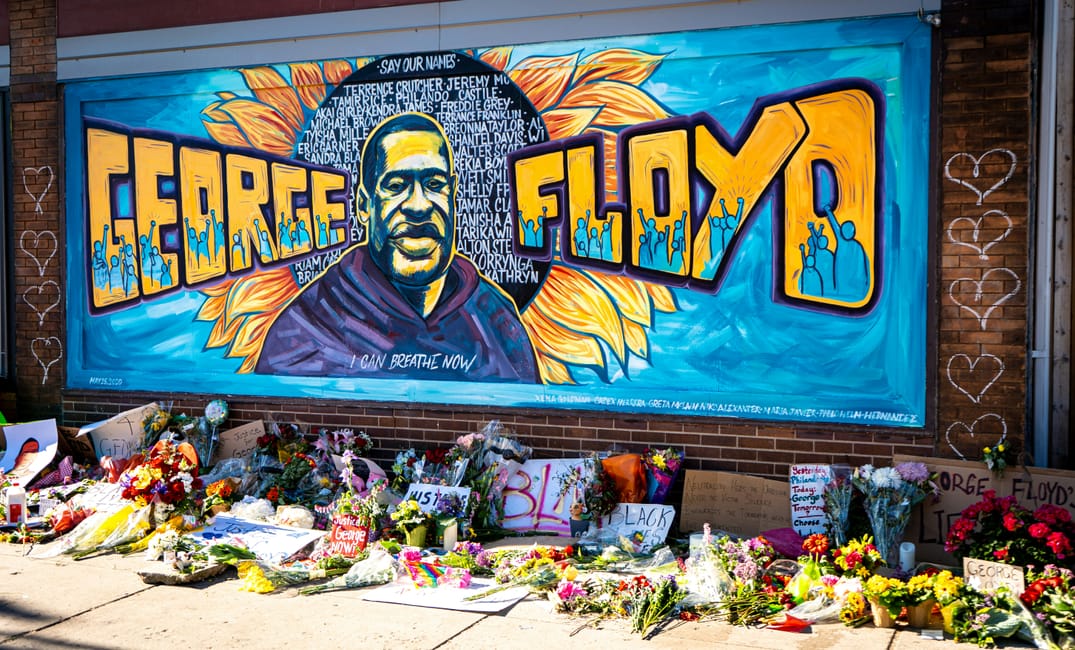By Jess Lomax
In response to the conviction of Derek Chauvin for the murder of George Floyd, US politician and Democratic Speaker of the House Nancy Pelosi remarked that Floyd had ‘sacrificed his life for justice’. Rightfully, this comment received backlash, not only for implying that George Floyd willingly surrendered his life, but that Chauvin’s conviction marks the birth of total racial justice in America. In implying this, Pelosi is essentially telling activists, organisers, and citizens that their work is over. This is clearly not the case.
Pelosi’s statement was not only misjudged in its implications that a Black man has to sacrifice his life in order for racial justice to be served – it was also completely false. George Floyd didn’t willingly sacrifice his life; he was murdered in broad daylight. In addition to this, arguing that the Derek Chauvin conviction has solved or reversed issues of institutional racism in the USA is ignorant and harmful. Chauvin’s conviction is groundbreaking not because it marks an end to institutional racism, but because it is one of the rare occasions we have seen a cop genuinely face consequences and accountability for their actions. Treating George Floyd as a martyr who died for a noble cause is a disservice to him, and implies that institutional racism – especially police racism – is no longer worth fighting against. Finding one cop guilty for one murder is not justice, and implying that a murdered Black man willingly gave his life for a greater cause is offensive and incorrect.
A guilty verdict was the deserved outcome of the Derek Chauvin trial, but the conviction marks accountability, not justice. Justice is the abolition of the system which killed George Floyd, Breonna Taylor, and Elijah McClain, and it is the conviction of all guilty cops who are implicated in acts of state violence. True justice is also unlikely to come about in this time of heightened police powers, whereby the police have been granted greater legitimacy to penalise people for breaking stay-at-home orders due to Covid. Though the US Congress is making efforts to pass the George Floyd Act in an attempt to monitor and limit police profiling, the bill has stalled in the Senate due to concerns from Republicans regarding qualified immunity, which protects law enforcement from being prosecuted for various illegal actions. In addition, it is still estimated that under the act 1000 Americans will still be killed by the police every year, the majority of these coming from minority backgrounds. This is 1000 too many. Reform is not a viable solution to state-sanctioned violence – the police have proven time and time again that regardless of what rules are in place, they know they will not face repercussions for their actions.
Pelosi, and other establishment politicians, have also cunningly ignored the importance of protest in determining Chauvin’s conviction. America lit up following the murder of George Floyd, and the Black Lives Matter movement gained unprecedented traction throughout the Summer of 2020. The work of community organisers, activists, and everyday citizens – not politicians – was crucial in drawing attention to Floyd’s murder and the institutional dangers faced by Black Americans. It took months of activism in the lead up to Chauvin’s conviction to even get him arrested for a crime that was caught on camera, let alone to get him convicted.
Nancy Pelosi’s comments regarding the rightful conviction of Derek Chauvin are worrying, because they appear to foreshadow a narrative that the system is fixed just because one man has faced consequences for his actions. If corporate Democrats like Pelosi use the Chauvin conviction to argue that the justice system in America is no longer racist or flawed, it is unlikely they will take the necessary action to address and fix the institutional racism still rampant within the American police system. The police remain a fundamentally racist institution, and one man being held accountable for his actions doesn’t mean it’s time for politicians or activists to take their foot off the gas. Chauvin’s conviction should not be treated as the be-all-and-end-all of racial justice – rather, it should be used to highlight the novelty and rarity of cops facing genuine accountability.
Thanks for reading our article! We know young people’s opinions matter and really appreciate everyone who reads us.Give us a follow on Instagram, Twitter and Facebook to stay up to date with what young people think.

